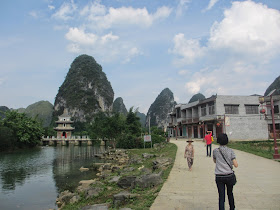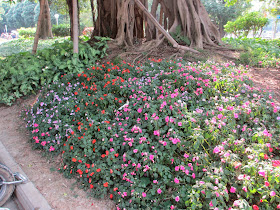Trip to Nanning, China
(8th May to 13th May 2014)
as recounted by Siew Leng
The distant
hills are a hazy grey under the scorching heat of a late afternoon sun.
Plume of white water gushes down crevices and cascades over rocky outcrops of tiered terraces bordered with verdant
vegetation. The torrent of water finally plunges into an enormous pool below us.
It is the fourth day of our trip to Nanning, China and we are now standing on a platform overlooking the Detian
Waterfall, located on the Sino-Vietnamese border and reputed to be the world's fourth largest transnational waterfall.
Prior to this we have just traversed the ten km slippery terrain of the Tonglin Grand Canyon and watched the spectacular Tonglin Waterfall with its sheer drop of nearly 168 metres from the top .
 |
| Treading gingerly down the slippery steps to the canyon below |
 |
| A river at the bottom of the canyon |
 |
| A long trek through the canyon |
 |
| We come across a waterfall in the canyon |
 |
| With my sis-in-law and our tour guide |
 |
| Admiring the spectacular fall |
Now as I gaze at the picturesque view before me, I begin to recollect about our trip from Melaka, Malaysia to the city of Nanning.
 |
| Standing on the platform with the Detian waterfall in the background |
 |
| A sight to behold |
On our way to a restaurant for dinner and later to our check-in hotel, Mirage Hotel, I manage to get glimpses of the city.
 |
| The Mirage Hotel in Nanning |
 |
| In front of the Mirage Hotel |
Nanning is the capital of the Guangxi Zhuang Autonomous Region in China and like the other cities in China, it is riding high on the country's economic boom. Everywhere there are signs of physical development and social transformation.
 |
| View of Nanning City from the coach |
 |
| High-rise buildings |
 |
| Road work in progress |
 |
One of the many supermarkets in the city. Many have high end items on sale
to cater to the wealthy tourists and the nouveau riche of China |
 |
| Cars and limousines on well-paved road |
 |
Motorcyclists choked the road. A tower crane rises
over high-rise buildings |
Our tour
group whose members are mostly senior citizens have done well, so
far.
 |
| Our tour group from Melaka |
We have
ventured into the depth of the Baimo Cave. Groping in its darkness and treading its slippery floor, we have emerged safe and sound.
 |
| The entrance to Baimo Cave |
 |
| Groping our way in the darkness |
 |
| Stalactites, stalagmites, and a subterranean lake in the cave |
 |
| The long walk reminds me of our trip down the salt mine in Warsaw |
 |
| Making our way across a bridge in the collapsed section of the limestone cave |
We have visited the E Quan Scenic Area and the Stephen Goose Spring. Any trip is incomplete without a story of the place and our local tour guide, Benjamin, was soon telling us about the origin of the Goose Spring. According to him, a long time ago the place was hit by a long drought. One day, Huan, a lady from the village went out with her geese in search of water. While walking along the parched earth, the ground in front of them suddenly gave way and water oozed from the ground. The spring water eventually formed a lake and came to be known as 'Goose Spring.'
The coach ride to the Bapantun longevity village is rather bumpy, but we managed to enjoy its rustic charm; lush plantations against a background of bluish karst mountains.The longevity village is so called because there are many octogenarians in the village and even a few centenarian whose longevity is attributed to the fresh air, clean spring water, organic food and the villagers simple life and active lifestyle.
It is the fifth day of our trip to Nanning and morning finds us on a covered bamboo raft on the Mingshi River, located on the Sino-Vietnamese border.
 |
| A bamboo covered raft |
 |
| Bamboo rafts line the bank |
 |
| We are off on our trip down the river |
 |
| Enjoying the view |
 |
| Serene landscape and clear sky |
As the raft drifts slowly down the river, we watch the lush and tranquil countryside rolls by. Mist-shrouded karst mountains provide a perfect backdrop to verdant bamboo groves that dot the grassy banks of the river. The scene is reminiscent of traditional Chinese landscape painting.
 |
| A bridge straddles the calm water |
 |
Below us, the clear water enables us to see the river grass
which is used as fodder for animals |
 |
| Clear water, lush vegetation against a backdrop of rugged mountains |
 |
| Surrounded by lush greenery, a lone figure waits patiently for a bite |
 |
| An ideal place for contemplation |
Our raft ride ends at one of the Zhuang villages where we are entertained to a cultural performance.
 |
| Watching a cultural performance |
 |
| Our tour group at the bank of the Mingshi River |
We are back in Nanning and it is the last day of our trip. Nanning is known as the 'Green City' due to its natural lush sub-tropical greenery and the many beautifully landscaped gardens filled with trees and colourful blooms. We spend the day exploring these parks and gardens before our flight home.
 |
| A tree reputed to be 1,300 years old |
Besides the trees and flowers there are pagodas, monuments, bridges and man-made lakes teeming with fish.
 |
| Posing in front of a pagoda |
 |
| A walk across an ornamental bridge |
 |
| A pond teeming with koi |
 |
| Writhing and squirming fish |
We visit a Cycad Garden and walk among the 'dinosaurs'.
The garden has over 10, 000 types of cycads and some of these prehistoric palms are more than 1,000 years old.
 |
| A cycad palm dating back to the prehistoric era |
 |
| Benjamin, our local tour guide walking along a road lined with cycad palms |
 |
| A baby 'dinosaur' emerging from an egg |
 |
| Get ready to run |
 |
| Among friendly 'dinosaurs' |
 |
| "Don't feed the 'dinosaur'!" |
During the trip there were some sights that caught my attention:
 |
Grains, nuts and other items displayed in sacks. Remind me of the grocer shops
of my childhood days |
 |
| An innovative water transport |
 |
These wooden pails are not for watering plants or for fertilising crops.
They are used as garbage bins. |
 |
| An indoor fish pond at the lobby of a restaurant |
Except for the hot humid weather, the trip to Nanning was pleasant and enjoyable.
















































































































